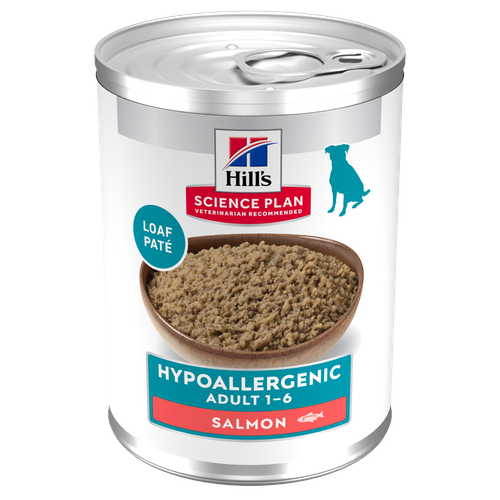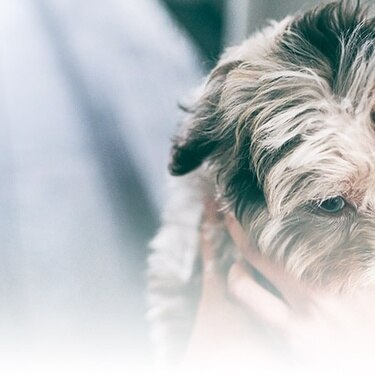
-
Find the right food for your petTake this quiz to see which food may be the best for your furry friend.Find the right food for your petTake this quiz to see which food may be the best for your furry friend.Featured products
 Adult Wet Dog Food with Beef
Adult Wet Dog Food with BeefHill's Science Plan Adult Multipack Wet Dog Food with Chicken, Beef & Turkey are complete premium pet foods for adult dogs from 1 year. Your dog will love these deliciously smooth and savoury minced loaves, formulated for balanced nutrition and overall health.
Shop Now Puppy Food
Puppy FoodHill's Science Plan Puppy Multipack Wet Dog Food with Chicken & Beef are complete premium pet foods for growing puppies from weaning until 1 year old and for pregnant and nursing dogs. Your puppy will love these deliciously smooth and savoury minced loaves, formulated for balanced nutrition and overall health.
Shop Now Mature Adult Dog Food
Mature Adult Dog FoodHill's Science Plan Mature Adult Multipack Wet Dog Food with Chicken & Beef are complete premium pet foods for mature adult dogs from 7 years. Your dog will love these deliciously smooth and savoury minced loaves, formulated to deliver the appropriate amount of energy to support the needs of adult dogs.
Shop NowFeatured products Mature Adult Wet Cat Food with Chicken
Mature Adult Wet Cat Food with Chicken
Tender chicken chunks in gravy for mature adult cats. Made with easy-to-digest ingredients, high-quality protein for lean muscle maintenance and antioxidant vitamins C+E for optimal health.
Shop Now Light Adult Multipack Wet Cat Food with Chicken & Ocean Fish
Light Adult Multipack Wet Cat Food with Chicken & Ocean FishTender chicken chunks in gravy for cats, with L-carnitine and fewer calories for ideal weight management. Packed with high-quality protein, omega-6s, and vitamin E for shiny fur and healthy skin.
Shop Now Adult Multipack Wet Cat Food with Beef, Ocean Fish & Chicken
Adult Multipack Wet Cat Food with Beef, Ocean Fish & ChickenTender chunks in gravy for cats, with high-quality protein to maintain lean muscle. With vitamin E and omega-3s & -6s for healthy skin and balanced minerals to support healthy vital organs.
Shop Now -
Dog
- Dog Tips & Articles
-
Health Category
- Weight
- Food & Environmental Sensitivities
- Urinary
- Digestive
- Joint
- Kidney
-
Life Stage
- Puppy Nutrition
- Adult Nutrition
- Senior Nutrition
Cat- Cat Tips & Articles
-
Health Category
- Weight
- Skin & Food Sensitivities
- Urinary
- Digestive
- Kidney
-
Life Stage
- Kitten Nutrition
- Adult Nutrition
Featured articles The Right Diet For Your Pet
The Right Diet For Your PetIn people, the right diet is very important. If you are eating the wrong way for your metabolism, activity level, age and lifestyle you could end up with health issues.
Read More Show some love with wet foods: a great choice for pets with health issues
Show some love with wet foods: a great choice for pets with health issuesShow some love with wet foods: a great choice for pets with health issues.
Read More The Incredible Science Behind Your Pet's Microbiome
The Incredible Science Behind Your Pet's MicrobiomeLearn what your pet's microbiome is, how it contributes to your pet's gut and overall health, and why nutrition is important in maintaining healthy microbiomes.
Read More -


Keeping your puppy in tip top health

You're the best person to keep your puppy bouncing with health and vitality. Not only are you responsible for their day-to-day health care, you're also the person who knows them the best. This makes you the ideal 'eyes and ears' of your vet between visits. A puppy that is being sick or a puppy with diarrhoea may be obvious signs of an issue, but there’s more to having a healthy puppy than just looking for signs of illness.
Puppy mouth and dental care
Dental disease is common in dogs, so one of the best things you can do for your puppy is to get into the habit of regular teeth cleaning. You shouldn’t just use any toothpaste however, as human toothpastes contain ingredients that are not suitable for dogs and are not designed to be swallowed. Not only are dog toothpastes safer, but your puppy will much prefer the flavours (think meat rather than mint). If you notice your puppy has issues like bleeding gums or foul 'dog breath’, report these to your vet. You can also buy dog toothbrushes from your vet, as well as special toothpastes formulated for dogs.
Is your puppy chewing on everything in sight? Adolescent chewing is different to teething chewing, since it occurs once all the needle-like puppy teeth have fallen out. Adolescent dogs often have an uncontrollable urge to chew and there are different theories as to why. Whatever the cause, if you want to safeguard your slippers, it's a good idea to provide your puppy with things they’re meant to chew!
Puppy ear care
Every couple of days, gently look inside your puppy’s ears to make sure they’re healthy. The skin should be clean and not red or angry-looking. Your puppy's ears should be free of excess ear wax or discharge and should not have an unpleasant smell. Don’t put anything in your dog’s ears unless a vet tells you to.
Watch out for head shaking or scratching at the ears. If you suspect your puppy has any ear problems, such as a bacterial or fungal infection, inflammation, or ear mites, don't hesitate to visit your vet.


Tasty Tips
Signs of a healthy puppy
A healthy puppy has bright eyes, a shiny coat, and lots of energy.
Remember your puppy can't tell you if they’re poorly, so it's up to you to keep a close eye. Knowing what’s normal for your dog is essential for spotting early on if anything is wrong. Worrying signs include:
- A sudden loss of appetite.
- Sleeping more than usual.
- Changes in behaviour.
- Rapid weight loss or gain.
- Any unusual lumps or bumps.
- Vomiting or diarrhoea.
- Problems with your puppy's eyes or ears.
Trust your instincts and always call your vet if you're in any doubt.
Puppy stress
It may not be a physical condition, but seeing your puppy exhibiting signs of stress can be equally distressing.
It's normal for a puppy to cry and whimper the first few nights they’re in your home. Ask the breeder, before you get the puppy, if you can take a blanket or toy to leave with them. This way the puppy will have something that smells of you at the breeder’s, and vice versa when they come home.
Once you're past the initial stages, other factors can also stress your puppy. Separation anxiety is a common problem. Once again, love and reassurance are the best medicine. If the problem continues or seems severe, talk to your vet.
Prevention is better than cure
Your puppy should have started on a course of vaccinations before coming to you, and your breeder or adoption centre should have given you a vet's certificate to prove this. Keeping up your puppy's vaccination schedule is one of the most important things you can do to keep them healthy. A regular worming programme and flea control are also important so you should ask your vet for details.
And, of course, one mustn't forget the role of exercise and a healthy diet. It’s very important that puppies are fed food formulated for puppies, rather than adult dogs. This may sound obvious, but puppies have different nutritional needs than adult dogs in order to support their growth and brain, bone and muscle development. Large breed puppies have slightly different needs from small and medium ones. Ask your vet to recommend a balanced and complete puppy food suitable for your breed and size of puppy.
Reviewed by Dr. Emma Milne BVSc FRCVS


One of our staff authors prepared this article for you
Related products

Hill's Science Plan Hypoallergenic Adult Wet Dog Food with Salmon is a complete premium pet food for all adult dogs from 1 year. This savoury tinned loaf is specially formulated for dogs with delicate skin and stomachs. It features a single novel animal protein source and is grain-free.

Hill's Science Plan Puppy Multipack Wet Dog Food with Chicken & Beef are complete premium pet foods for growing puppies from weaning until 1 year old and for pregnant and nursing dogs. Your puppy will love these deliciously smooth and savoury minced loaves, formulated for balanced nutrition and overall health.

Hill's Science Plan Mature Adult Multipack Wet Dog Food with Chicken & Beef are complete premium pet foods for mature adult dogs from 7 years. Your dog will love these deliciously smooth and savoury minced loaves, formulated to deliver the appropriate amount of energy to support the needs of adult dogs.

Hill's Science Plan Adult Multipack Wet Dog Food with Chicken, Beef & Turkey are complete premium pet foods for adult dogs from 1 year. Your dog will love these deliciously smooth and savoury minced loaves, formulated for balanced nutrition and overall health.
Related articles

Learn about the potential health risks of a raw diet for dogs and why they aren't the best option for your pup or you.

How, when and what to feed your new puppy is an important decision, learn more about the things to consider for feeding your puppy.

Many human foods are dangerous to dogs. Read about 5 of the worst toxic food offenders that can kill your dog - and how much it takes to hurt them.

Learn effective tips for feeding a dog that's a picky eater and ensure proper nutrition for a finicky eater. Discover tips for pet parents at Hill's Pet UK.

Put your dog on a diet without them knowing
Our low calorie formula helps you control your dog's weight. It's packed with high-quality protein for building lean muscles, and made with purposeful ingredients for a flavourful, nutritious meal. Clinically proven antioxidants, Vitamin C+E, help promote a healthy immune system.
Put your dog on a diet without them knowing
Our low calorie formula helps you control your dog's weight. It's packed with high-quality protein for building lean muscles, and made with purposeful ingredients for a flavourful, nutritious meal. Clinically proven antioxidants, Vitamin C+E, help promote a healthy immune system.

